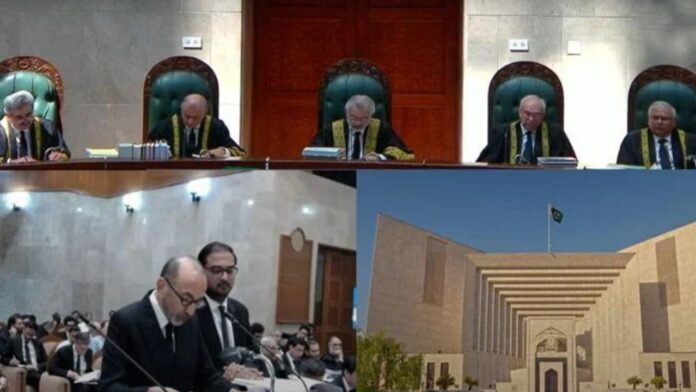During a Supreme Court full bench hearing on the Sunni Ittehad Council’s applications for reserved seats, Justice Ayesha Malik emphasized that seats must be allocated according to the principle of proportional representation.
Chief Justice Qazi Faez
Chief Justice Qazi Faez Isa led the full bench, hearing appeals by the Sunni Ittehad Council against a Peshawar High Court decision on reserved seats. Sunni Ittehad Council’s lawyer, Faisal Siddiqui, argued that the Election Commission did not allocate their party symbol to Chairman Hamid Raza, forcing him to run as an independent candidate. Siddiqui mentioned that Jamiat Ulema-e-Islam (F) does not allow minority members, and if reserved seats were granted, Kanwal Shauzab would be their candidate.
The court inquired about Hamid Raza’s nomination papers, confirming his affiliation with the Sunni Ittehad Council. Chief Justice Isa remarked that claims must be substantiated with documents. The court received Raza’s nomination papers from the Election Commission for verification.
Makhdoom Ali Khan
Makhdoom Ali Khan, representing members elected on reserved seats, stated that the Election Act requires political parties to submit lists for reserved seats transparently. He argued that since the Sunni Ittehad Council did not submit such a list, they cannot claim reserved seats. Justice Mansoor Ali Shah questioned the timing of the Sunni Ittehad Council’s recognition as a parliamentary party.
Khan emphasized that proportional representation for reserved seats is based on general seat results. He referenced the Peshawar High Court decision upholding the Election Commission’s ruling. Chief Justice Isa noted the court’s role in interpreting the law, focusing on the points raised in the appeals.
Justice Athar Minallah
Justice Athar Minallah highlighted that Hamid Raza showed his Sunni Ittehad affiliation in his nomination papers, potentially granting the council a general seat in parliament. However, a party ticket is necessary to confirm affiliation. Khan cited a letter from Raza stating he did not contest under the Sunni Ittehad symbol, with Justice Minallah countering that election symbols are irrelevant to party participation.
Justice Ayesha Malik questioned Raza’s prohibition from contesting on a party ticket. She suggested the Election Commission’s confirmation could change the case’s direction. Justice Muhammad Ali Mazhar noted the council had an election symbol, yet no one contested under it. Khan asserted that the Sunni Ittehad did not raise this point in their appeals.
Chief Justice Isa reiterated that arguments must be based on filed documents. Khan argued that only parties submitting lists before elections could later claim reserved seats. Justice Yahya Afridi noted the issue stemmed from the Election Commission’s February 2 order misinterpreting the court’s ruling.
Khan contended that the law mandates proportional representation based on submitted lists. Justice Muneeb Akhtar asked about the Election Commission declaring PTI-affiliated candidates as independents. Khan explained that independent candidates initially showed PTI affiliation but later withdrew.
Justice Minallah stressed the Election Commission’s duty to protect voter rights and ensure transparency. Khan maintained that the reserved seat allocation must follow the Constitution. Jamal Mandokhel underscored the importance of women and minority representation.
Justice Muneeb Akhtar
Justice Muneeb Akhtar questioned if a party could lack reserved seats. Khan stated that if a party does not submit a list for women or minority seats, those seats remain vacant. Active voice: Justice Malik asked how to distribute these seats, noting that PML-N had received both general and reserved seats.
Chief Justice Isa concluded that representation for women and opposition should be the primary concern, learning from history. Khan argued that reserved seats distribute based on the number of general seats, requiring independent candidates to join a party with at least one general seat.
Justice Minallah highlighted misinterpreting the Election Commission’s order and suggested a review. The court adjourned the case pending further hearings.


